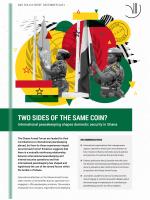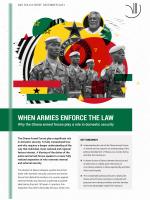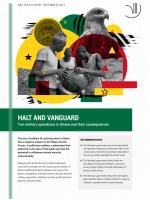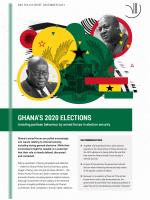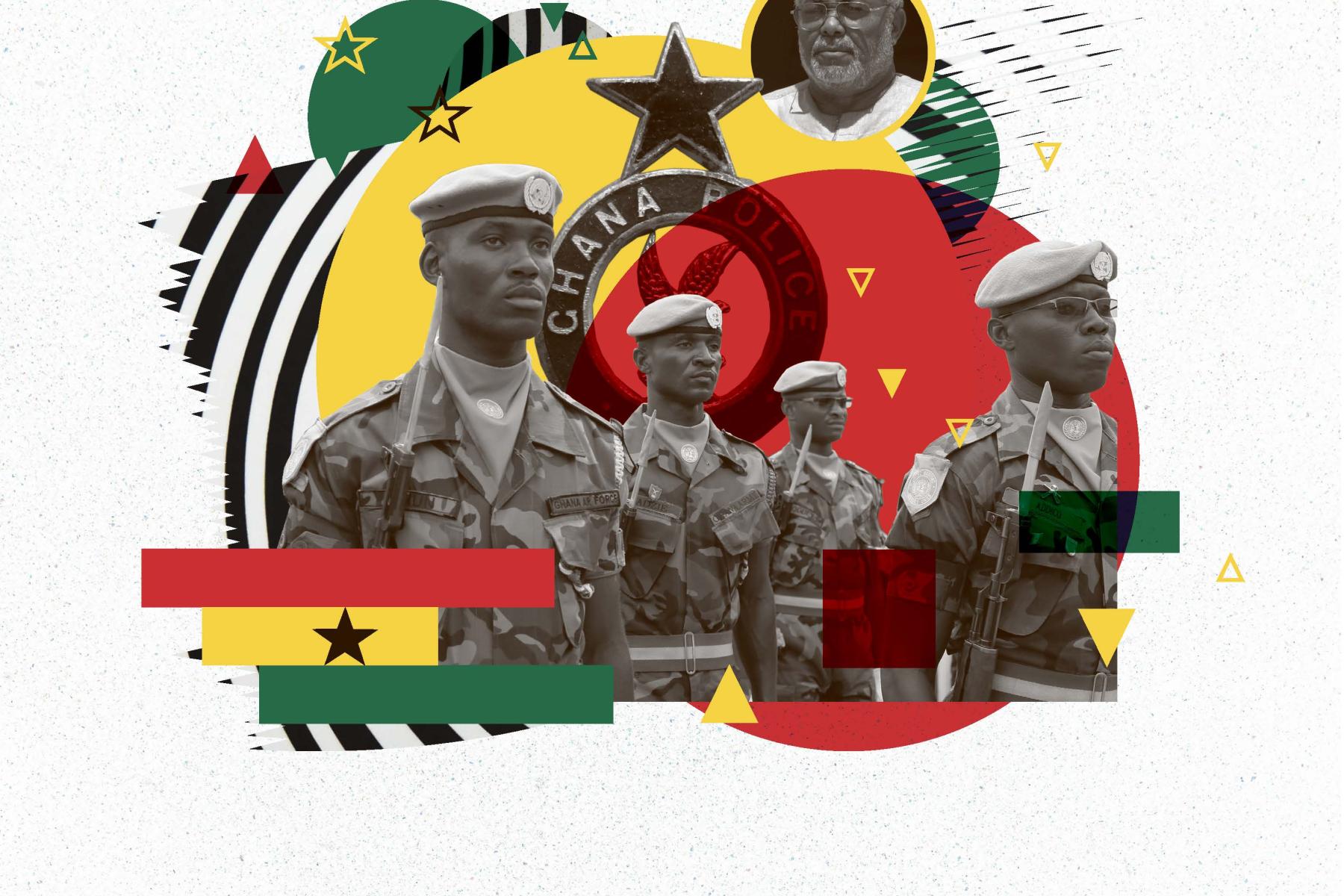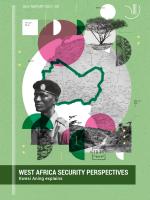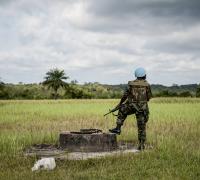Two sides of the same coin?
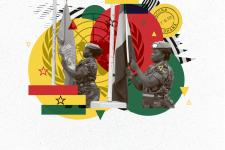
- International organisations that manage peace support operations should give more attention to how missions influence domestic security policies and practices of countries that provide troops.
- Ghana’s politicians should consider how the close link between international peacekeeping and internal security operations has transformed and continues to transform the Ghana Armed Forces.
- Journalists, academics and civil society activists should engage in constructive public debates about the broad range of implications of contributing to peacekeeping, positive as well as negative.
The Ghana Armed Forces are lauded for their contributions to international peacekeeping abroad, but how do those experiences impact security back home? Evidence suggests that there is a mutually reinforcing relationship between international peacekeeping and internal security operations and that international peacekeeping has shaped and legitimised the use of the armed forces within the borders of Ghana.
International attention on the Ghana Armed Forces often centres on the benefits that are garnered from engaging in UN peacekeeping missions. Discussions emphasise how missions, especially those deploying in West Africa, have had a stabilising effect on Ghana and framed the armed forces as professional and culturally sensitive. Moreover, emphasis has been on the importance of economic gain – both for individual soldiers and the institution – and on the democratising effect that contributions to peacekeeping have had on the armed forces.
Much less publicised and discussed internationally is the comprehensive role that the armed forces are directed to play in internal security operations, mainly by Ghana’s political elite. Even less attention, inside and outside the country, has been given to how international peacekeeping and internal operations are connected and shape one another; they are strinkingly similar, and also mutually reinforcing. This connection has gradually intensified since the end of the Cold War, as the number and activities of both types of military practice – peacekeeping and internal operations – have multiplied and expanded.
Wide-ranging responsibilities at home
While the Ghana Armed Forces may be known primarily for their role in peacekeeping, they are considerably more engaged inside the borders of Ghana in what are officially called internal security operations, at times referred to in public debates as internal peacekeeping. Cutting across the divide between internal and external security responsibilities, these operations cover both policing and defence roles and can be divided into three broad categories:
- Those set up to respond to external threats, and that are therefore the most in line with armies’ traditional role: e.g. Operation Conquered Fist that deals with counterterrorism and Operation Sit Down Look which gathers border crossing intelligence.
- Those that respond to localised disagreements that could develop into wider conflict: e.g. Operation Gong-Gong that deals with chieftaincy disputes, primarily in northern Ghana.
- Those that take on some variety of policing on a semi-permanent basis: e.g. Operation Vanguard that deals with illegal mining and especially Operation Calm Life that was established in response to armed robberies and is now part of routine patrolling inside and outside Ghana’s main cities.
The politics of internal operations
There are many reasons why the political elite in Accra involves the military in internal security. The police are under-resourced and appear weak, politically biased towards and under the control of the party in power as well as corrupt in the eyes of many Ghanaians. By extension, because politicians want to appear tough on crime, the armed forces are considered the most effective security instrument available.
International operations help us to perform the task [of internal peacekeeping] in Ghana much better. You are not under the same type of pressure.
Furthermore, military participation in internal operations as well as international peacekeeping is considered by some politicians to provide evidence of military relevance. Given the absence of an immediate external enemy to Ghana, internal operations legitimise the spending of considerable resources on replenishing the Ghana Armed Forces’ stockpile without attracting unnecessary public attention.
Finally, the armed forces’ experiences from peacekeeping, and the recognition they derive from this role, may have contributed to normalising the deployment of army personnel for domestic purposes. This is because, while there are obvious differences between international peacekeeping and internal security operations, there are also striking similarities.
Similar roles at home and abroad
The connection between the two primary roles of the Ghana Armed Forces was clearly articulated by a number of officers during interviews for the project Domestic Security Implications of Peacekeeping in Ghana, carried out between 2019 and 2021 across Ghana in Accra, Tamale and Sunyani:
’What is peacekeeping?’ one senior officer asked rhetorically during a conversation, ’peacekeeping is internal security duties being carried out in somebody else’s country. We do patrols in Ghana, we call it [Operation] Calm Life, it’s like in peacekeeping. VIP protection and escorts we do in both places. It has helped us a lot to do internal operations as well as peacekeeping. [Indeed, the mutual dependence of international peacekeeping and internal operations] is one of the reasons why it will be difficult to reduce internal security duties.’
’It is our record from peacekeeping that mostly influenced the decision to introduce the military internally,’ another officer said. And it works in the opposite direction as well, as a young officer suggested: ’Based on our teaching, doctrine, peacekeeping duties and Calm Life, there is no difference between the two. There is a very direct link. If we did not have the experience from here, how would we go out there?’
We know how to at least fraternise with them [hostile groups], get their view and establish some degree of mutual trust. Try to get some info from them. When we come to Ghana, it is the same thing we do.
The existence of a mutually reinforcing relationship between internal operations and international peacekeeping is reflected in practices that are recognised as characteristic of both. On peacekeeping, even in the more violent and dangerous cases of peace support operations in parts of the Democratic Republic of the Congo, a key activity carried out regularly is patrolling. This is why Operation Calm Life in Ghana is mentioned as comparable.
Equally, escorting VIPs and civilians, the latter commonly labelled ‘protection of civilians,’ is a key aspect of peacekeeping, and an equally central dimension of internal security operations. Protection within Ghana is in many cases provided for police personnel, but also for other civilian staff such as the Forestry Commission in Operation Halt, and chiefs and their families in Operation Gong-Gong.
Furthermore, one aspect that the Ghana Armed Forces excel at in peacekeeping, and are recognised for, is identifying and liaising with local authorities, including elders, chiefs and local warlords, often in physically and psychologically harsh conditions such as Darfur and South Sudan. It is an approach that is recognisable from how deployments are approached in Ghana, where it is essential that local hierarchies are respected and engaged, also – or perhaps especially – when state-sanctioned security agencies enter local communities. Very rarely, if at all, will Ghanaian soldiers exchange fire with adversaries, and evidently neither peacekeeping nor internal security operations are designed for warfighting.
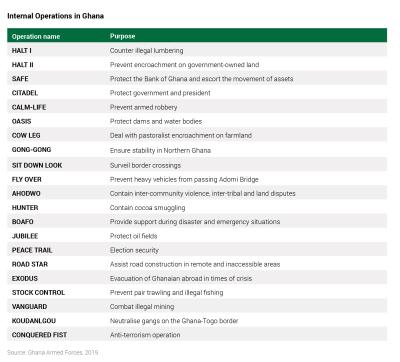
Converging logics
The statements by the army officers above reflect how many members of the armed forces’ rank and file talk about internal operations, international peacekeeping and the connection between the two. Their attitudes often do not mirror the official line of the Ghana Armed Forces’ leadership or the political elite, which centers on the perceived necessity to escalate the state’s security response to issues that would otherwise overwhelm the police.
However, the coupling of international peacekeeping and internal operations rationalises the logic behind and gives impetus to politicians’ push to use the army in what in many cases are de facto policing roles.
Because of their perceived similarities in terms of activities, international peacekeeping serves to legitimise internal security operations. The former makes the latter look like less of an affront to how and between whom the responsibilities of internal (police) and external (military) security are commonly distributed.
The link is further underscored by a foundational condition of the Ghana Armed Forces, namely that they have never been to war to defend the country’s borders from an invasion or deployed to quell an insurrection that threatened to topple the government in Accra. Internal operations and international peacekeeping are the only consistent military experience of the armed forces. This has contributed to them becoming more aligned and partially mutually constitutive.
This policy brief is an output from the research programme Domestic Security Implications of Peacekeeping in Ghana (D-SIP), funded by the Danish Ministry of Foreign Affairs and supported by the Danish Fellowship Centre.
DIIS Experts

